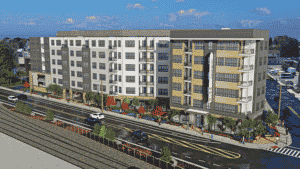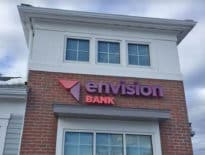The first large apartment complex has been proposed in Framingham since the city’s 15-month multifamily development moratorium expired.
Boston-based Boghos Properties hopes to build 176 rental units on two neighboring parcels 358-380 Waverly St. and 16 South St. totaling 1.53 acres. The project site is a stone’s throw from the city’s commuter rail station and historic downtown.
The 6-story, wood frame-on-podium development will have 217 vehicle and 54 bicycle parking spaces across the podium’s first and second floors. The podium roof will also support an interior amenity courtyard.
Other amenities shown in plans filed with the city include a fitness center and club room. Just over 3,000 square feet of ground-floor retail space will also be included in the development.
The unit mix will include 96 one-bedroom and 80 two-bedroom units.
The project will need a site plan review, a special permit, a stormwater permit and relief from dimensional and off-street parking requirements. Its first hearing will be on July 21.
City Planning Director Sarkis Sarkisian told Banker & Tradesman that the Boghos project is the first of several large, new multifamily developments in the pipeline to be formally proposed since the city’s development moratorium expired. A recent city presentation identified three projects in the conceptual design phase totaling 947 units, including 94 affordable units, in addition to Boghos’ Waverly Street project.
The City Council passed the moratorium nearly unanimously over former Mayor Yvonne Spicer’s objections in the fall 2020, and extended it for an additional three months in 2021. The ostensible aim was to give city officials time to understand the impacts of multifamily development on school enrollment.
Developers had built over 1,400 multifamily units in and around downtown Framingham between 2015 and 2020.
However, research conducted by Sarkisian’s office earlier this year showed only 47 students residing in those units.
Mayor Charlie Sisitsky hopes to encourage more transit-oriented development downtown, Sarkisian said, noting the city plans several investments in the neighborhood including a revamp of the closest park to downtown and the hoped-for conversion of Framingham’s Memorial Hall into an arts center. Amid the development wave, the administration is planning to add to the city’s inclusionary zoning requirements, Sarkisian said. Under the proposal, the city’s current requirement for 10 percent of a project’s units to be affordable to renters making 80 percent of area median income would be buttressed by a new requirement for an additional 4 percent of the units to be made affordable for renters making 50 percent of area median income as rents and demand for apartments soars across the region.







